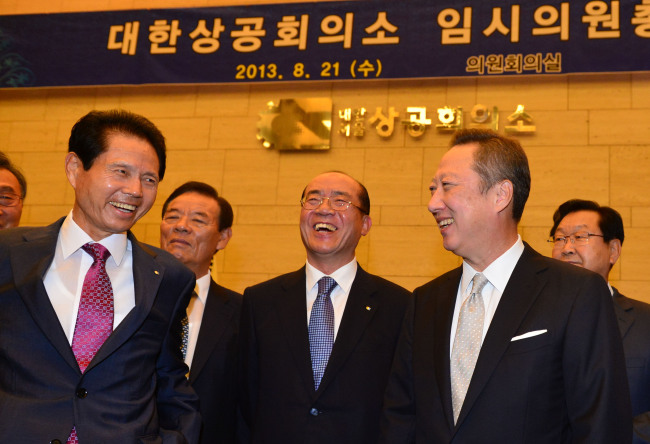Park stresses talks before new laws
New KCCI chairman voices concerns about economic democratization
By Korea HeraldPublished : Aug. 21, 2013 - 20:56
Doosan Group chairman Park Yong-maan, who took office on Wednesday as head of the Korea Chamber of Commerce and Industry, stressed more talks among stake-holder groups were needed before the government imposes any new regulations on business imposed.
He said companies had provided a pretext for many of the pending “economic democratization” measures that, among other things, aimed to toughen monitoring of business activities. But he stressed that more rules did not entail the best solutions.
“I believe we can draw better, more flexible solutions if all the stake-holding groups have more open talks before any new laws or regulations are proposed,” he said during a press conference following his inauguration ceremony at the KCCI building in central Seoul.
He said companies had provided a pretext for many of the pending “economic democratization” measures that, among other things, aimed to toughen monitoring of business activities. But he stressed that more rules did not entail the best solutions.
“I believe we can draw better, more flexible solutions if all the stake-holding groups have more open talks before any new laws or regulations are proposed,” he said during a press conference following his inauguration ceremony at the KCCI building in central Seoul.

“I would support the KCCI playing a better role in mediating communication between the government and companies.”
Park took the helm of the nation’s largest and oldest business lobby group for 140,000 small and large companies at a tough time, as the public demands businesses play more society-oriented roles while the government is upping pressure with new laws.
The KCCI, together with other business groups here, had already delivered their opinions on the pending bills that would be discussed during the parliamentary session in September. Based on their suggestions, the revised bills are planned to be announced on Friday.
Even though he said he was waiting for the final announcement, he pinpointed two issues ― the ordinary pay issue and the stalled foreign investment law ― as the biggest concerns among KCCI member companies.
“Business owners, especially small and mid-sized firms, voiced their concerns about the ordinary pay issue, saying it could collapse altogether,” he said of the recent court ruling that quarterly bonuses should be counted as part of the ordinary salary.
While the labor sector welcomed the decision, businesses have been voicing concerns over increased costs as the ordinary salary is a base to calculate other overtime pay.
He also urged the prompt approval of a new law on foreign investment that aims to ease regulations on the joint venture between foreign-based firms and local companies. Due to the resistance from opposition parties, he said the injection of new investment worth 2.3 trillion won ($2.1 billion) had been blocked.
The 58-year-old Doosan chairman in late July was named the new KCCI chief to succeed Sohn Kyung-shik, the embattled CJ Group co-chairman who stepped down earlier in the month before his term was over.
He is the fourth in his family ― after his father, the late Park Doo-byung who founded Doosan, and his brother Park Yong-sung ― to hold the chairman position.
Park dismissed any problems in handling the two crucial roles as chairman of the nation’s 12th-largest conglomerate and KCCI head, saying he would have not accepted the offer if he expected conflict.
During the press meeting, he said out that local companies needed to elevate their social status as well as economic status in Korean society.
“I’m not saying that companies should seek more power. They need to do more social roles that are suitable to their economic growth,” he said.
“Then, we can earn the public support and respect that we deserve for our contribution to society.”
By Lee Ji-yoon (jylee@heraldcorp.com)
-
Articles by Korea Herald



















